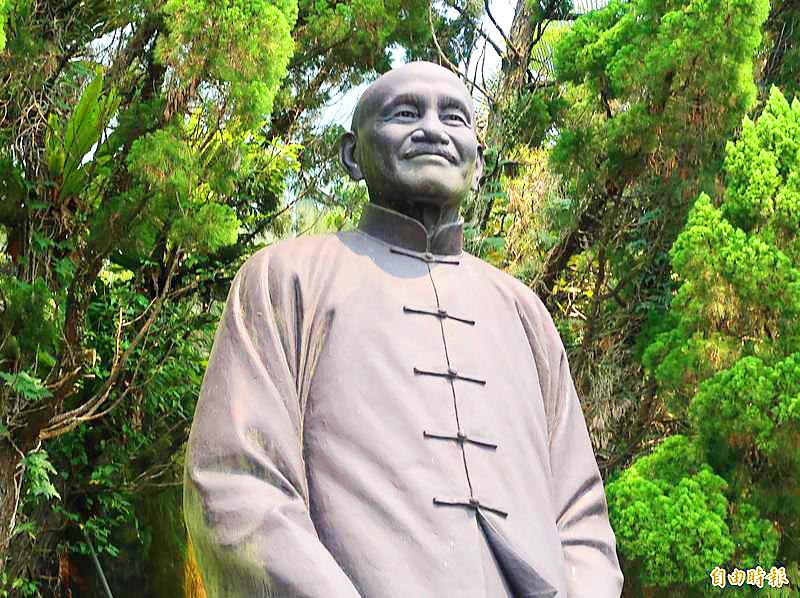In its final months, the Transitional Justice Commission yesterday reported on its progress to the Legislative Yuan, while saying that Chiang Kai-shek Memorial Hall (中正紀念堂) and Ching-kuo Chi-hai Cultural Park (經國七海文化園區) are authoritarian symbols.
The commission’s acting minister, Yeh Hung-ling (葉虹靈), said that 5,954 guilty verdicts had as of Feb. 28 been dismissed.
The commission has reviewed and officially recognized 42 locations where injustices were committed and has pushed them to be conserved, she added.

Photo: Chen Yu-fu, Taipei Times
The operations of national intelligence and martial courts in the 1970s were reviewed and a report to be presented to the legislature in May is being drafted, Yeh said.
The commission is to disband in May.
New Power Party Legislator Chiu Hsien-chih (邱顯智) asked commission members whether President Tsai Ing-wen (蔡英文) had discussed with them her appearance at January’s opening of the Ching-kuo Chi-hai Cultural Park in Taipei’s Dazhi (大直) area.
Yeh said that the commission had informed the president that it considers Chiang Ching-kuo (蔣經國) to be an authoritarian figure and the park an authoritarian symbol.
“We should not commemorate an authoritarian figure,” Yeh said.
Public money should not be used to commemorate a dictator, Yeh said, adding that the commission has plans — with an announcement to be made next month — to repurpose Chiang Kai-shek Memorial Hall into a park where people can reflect on Taiwan’s autocratic past.
Separately, Democratic Progressive Party Legislator Lai Pin-yu (賴品妤) said she is “very dissatisfied” with the commission’s progress on removing statues, busts and portraits of the two Chiangs.
More than 55 percent of the 1,533 locations with commemorations of the two have refused to discuss their removal, Lai said, adding that she is not certain that the Executive Yuan, set to take up the commission’s work in May, can succeed where the commission has fallen short.
There are insufficient legal grounds for removing statues, busts and portraits, Yeh said, adding that most of them are at sites overseen by the Ministry of National Defense, the Veteran’s Affairs Council and the Ministry of Education.
The commission suggests higher agencies step in and make the removals when subordinate agencies cannot agree, Yeh said.

Beijing could eventually see a full amphibious invasion of Taiwan as the only "prudent" way to bring about unification, the US Department of Defense said in a newly released annual report to Congress. The Pentagon's "Annual Report to Congress: Military and Security Developments Involving the People's Republic of China 2025," was in many ways similar to last year’s report but reorganized the analysis of the options China has to take over Taiwan. Generally, according to the report, Chinese leaders view the People's Liberation Army's (PLA) capabilities for a Taiwan campaign as improving, but they remain uncertain about its readiness to successfully seize

Taiwan is getting a day off on Christmas for the first time in 25 years. The change comes after opposition parties passed a law earlier this year to add or restore five public holidays, including Constitution Day, which falls on today, Dec. 25. The day marks the 1947 adoption of the constitution of the Republic of China, as the government in Taipei is formally known. Back then the Chinese Nationalist Party (KMT) governed China from Nanjing. When the KMT, now an opposition party in Taiwan, passed the legislation on holidays, it said that they would help “commemorate the history of national development.” That

Taiwan has overtaken South Korea this year in per capita income for the first time in 23 years, IMF data showed. Per capita income is a nation’s GDP divided by the total population, used to compare average wealth levels across countries. Taiwan also beat Japan this year on per capita income, after surpassing it for the first time last year, US magazine Newsweek reported yesterday. Across Asia, Taiwan ranked fourth for per capita income at US$37,827 this year due to sustained economic growth, the report said. In the top three spots were Singapore, Macau and Hong Kong, it said. South

HORROR STORIES: One victim recounted not realizing they had been stabbed and seeing people bleeding, while another recalled breaking down in tears after fleeing A man on Friday died after he tried to fight the knife-wielding suspect who went on a stabbing spree near two of Taipei’s busiest metro stations, Taipei Mayor Chiang Wan-an (蔣萬安) said. The 57-year-old man, identified by his family name, Yu (余), encountered the suspect at Exit M7 of Taipei Main Station and immediately tried to stop him, but was fatally wounded and later died, Chiang said, calling the incident “heartbreaking.” Yu’s family would receive at least NT$5 million (US$158,584) in compensation through the Taipei Rapid Transit Corp’s (TRTC) insurance coverage, he said after convening an emergency security response meeting yesterday morning. National